- Home
- William Golding
The Double Tongue Page 2
The Double Tongue Read online
Page 2
When I came out again I had to stand in front of my honoured father with my hands properly clasped in front and my eyes looking at the floor midway between us. My mother started to speak but my father silenced her with a gesture.
‘In this kind of situation, Demetria, it is almost always the girl’s fault.’
There was a long silence after that. My father broke it at last.
‘I suppose you know, young lady, that you’ve got young Leptides into trouble? He’s been sent off to do three months’ military training. I don’t wish to see you any more. Now go.’
So I curtsied and went to my place. Of course, whatever my father said, the military training was not really a punishment like bread and water, solitude and plain hemming. My mother said it would get all the nasty thoughts out of his head and he might even form a lasting friendship with one of our brave soldiers. Of course the men of our degree are cavalry. Indeed, boys who get sent early to military training think it’s a holiday and come back boasting of being on watch in the middle of the night ‘like the other men’. I was very lonely at this time and became acutely aware of my own insignificance. In addition to being scrawny with a lopsided face I am on the sallow side. My nurse told me that my father would have to pay an extra large dowry to get me off his hands, which is why he was so stern with me. She said it was enough to make any man stern because what did he get out of it? The proper dowry for a girl of my degree – provincial aristocrat – would be a thousand silver pieces. He would have to pay more like two thousand.
There were times, as I moved towards my courses, when I still had hopes that the gods and in particular Aphrodite would work their customary miracle and turn a child with my natural disadvantages into a flower-like creature and do it more or less in a single night. There is a dread insult in our part of the world, and I sometimes thought I saw it behind the faces of the people responsible for me – the thought that I should have been disposed of at birth, though of course no one ever uttered the words and I dare not myself. But the thought was there, behind their faces.
I was brooding on all this one day and going towards the fish tank when one of our boughten slaves came whining out of their place with a child in her arms and thrust it at me. She was howling by the time she reached me. My arms came up automatically to cradle, but almost as quickly I used them to push the child back at her for it was covered with spots. She, curious creature, fell silent at that, ducked a lame reverence and walked back again into her own place. But I had felt something in the instant between holding and letting go. I should be hard put to describe it further. So my simplest recourse is to tell you baldly that the girl believed I had some power and that once I had touched the child it would get better, which it did. This goes back to the half-cooked fish, a story which was now a bit of family history and, like most family history, simplified and exaggerated. I do not think I am a healer and I am the one to know, surely!
We are wrapped in mysteries. I know that. I have come to know that. Until I had my courses time did really stand still for me. I know that too. Yet among us Hellenes, whether we are Aetolians or Achaians or no matter what, courses come later according to our degree. I was in my fifteenth year. Things made a kind of unruly sense. This time it wasn’t fish or even a baby, but a donkey. I have told nobody, ever. This donkey turned the mill for the coarse grain. Naturally, meal for the family was done at a rotary quern with the slave women singing the turning song, usually the one about Pittacus, but quite often if another name would fit the turning they used it. This donkey, which naturally again we all called Pittacus, walked round and round and at the end of a bar a huge ball of stone rolled round in a groove full of grain, or sometimes the mush from the olive’s third pressing. Well of course you know how that kind of mill works! I was watching Pittacus and interested in his thing which he had under his belly which was sticking out and hurting him because he was braying so loudly as he walked round. This thing was as if alive on its own and quite separate from poor Pittacus it seemed. Every now and then it would snap up against his belly with a sound like hitting a big drum. It was then that a weirdness overcame me so that I felt I might fall down. But I pushed through that because I was interested and horrified and frightened. At the moment when I emerged – if emerged is the right word – one of our boughten slaves came with a gag and I was fascinated by the struggle. He had to strap the animal’s jaws together to keep its mind on the work in hand. Pittacus was trying to rear, but could do nothing but strike out sideways with a hind leg. I found out afterwards that he had scented one of our most valued mares which was to mate with my father’s war stallion, so Pittacus couldn’t be let go even when the mush was all pulped.
There is something very strange about girls immediately before menstruation. I don’t mean the pretty ones, the beauties or even those who are comely enough to be welcomed into a family with only a modest dowry. I mean really the unattractive ones, whom a god has blighted and who have nothing for sale and who have become so defensive they can never make contact with anyone, least of all with the rites of the Paphian. They acquire, these unfortunates, strange abilities. Or perhaps abilities is the wrong word. The situation is not really describable, except that the girl becomes very clever in a useless way – useless it may be to anyone else, though the girl may think there is substance in it. Well. It may be indescribable but I will do my best. It is a furtive power. They wish: and if they wish in the right way – wrong way? – sometimes, if the balance is ever so slightly on their side, then – just more often than not but only just – they get what they want or somebody does. The world is riddled with coincidences and the girl sees this. She uses this when it is available. Perhaps to somebody else who gets what he wants. Or, I mean, gets what he didn’t want. You can never prove this. As I said it is furtive and dishonest, knows how to hide, how to claim, how to disguise, avoid, speak double like the snake or not at all. Moreover, this is not a power to be exaggerated. It is no oracle, does not win battles. It cannot cure the plague but only some headaches, cannot cure heartache but can supply the necessary tears for it.
When my father clapped me up on bread and water the first time, he took my doll away. I wished it back but, of course, how could it come? But when they let me out I knew where they had put it and went straight there. I knew indeed where it was, went and took it because they were such and such and would put it there. So I watched the donkey Pittacus struggling against the spikes in his gag and the weirdness overcame me and I quietened him, feeling the consolation and love go out, out through my aching head and suddenly reeling mind, out to poor Pittacus, and quietened him in his struggle so that his tail dropped and his member drew back in and he stood silent at the mill with his head down by his feet. It was at that moment that I heard a shout of laughter and there was Leptides grinning over the wall of the yard and showing his teeth through a sandy beard and crying aloud to the whole world: ‘He fancies you!’ Into that blazing moment, drawn and irritated by the ass’s clamour, strode my father. He stopped ten yards away. He went white, turned and fairly ran into the house. My head cleared as if he had run out of it. There was a great silence of change and discovery. I heard a faint but positive tap and, by some instinct looking down, I saw the first drop of my blood starred on the strap of my right sandal.
After that of course I disappeared into the women’s quarters and the usual sacrifices were made. I went into a five-day period of seclusion. The ass in rut and Leptides’ loud, male laughter and his shouting out what ought not be said – they were a kind of initiation into my new state.
I must have been happy some of the time. I think girls are created to be happy for a time in childhood. They can be happier in their skins than men, or boys rather, who have always to be doing something, mischief probably. But now of course, aged fifteen, I was grown up. It was difficult. Sometimes I think, and indeed thought at this early experience of being grown up, that we should be free and natural as birds are. What should we think of a bird which was different an
d feverish, that never flew but sat all the time on a nest? But my parents expected such normality. It should have been easy enough, for all I had to worry about were my courses and all the rituals attached, but the rituals didn’t bother me and my courses hardly hurt me – merely added to the confusion in my head and a slight headache for a day and a half. They were just enough to remind me that women aren’t free, not even the free ones. It was like a not very heavy chain which had been waiting to fasten itself round my waist to ensure that I was a prisoner like all women. The only consolation was that for a few days each month I was untouchable. What followed was that on those days I could have any thoughts I wanted without the gods taking any notice of them, because the thoughts were untouchable, too. I have never told anyone this truth because it is a mystery and only to be written down rather than spoken. So on those days when I was thought to be unclean I found myself thinking all kinds of forbidden thoughts and planning to put them away somewhere safe. I do it now for I am in my eighties and what does anything I do matter?
As I was grown up, when my father had guests who were suitable – and I don’t think my father ever had guests who weren’t – I was sometimes allowed to sit on a high chair by my mother in hers. Of course neither my mother nor I said anything on these occasions and if a guest was so forgetful of his manners as to address either of us directly my father would answer for us as was proper. So, though I saw Ionides very soon after I grew up, I never spoke to him. He was rangy and restless and gaunt. Though he was not much more than thirty years old there was grey in his hair and a grey tone round his mouth and chin where he had shaved in the Alexandrian manner. He smiled sometimes out of his gaunt face and you could see how the muscles moved under the skin. It was a strange smile. There was a grief in its appearance which I am sure enough he did not really feel. It was there, you might say, partly by accident and partly by his position which was distinguished. He was, in fact, the priest who had to interpret the mouthings of the Pythia when she was beside herself on account of inspiration. The second visit he made, there came a moment when he actually smiled at me, which in a younger and less distinguished man would have been suggestive. But it was a kind, sad smile and it moved me much as my brother had done. I dared to smile downward slightly and drew my scarf closer. I was conscious of wearing my best dress, the one with the egg and dart border. I am sure there was some kind of communication he intended, after an appraisal taken. It was like the first glint of the sun. The very next day my father sent for me. This was not to the large hall where we entertained our guests but to a smaller room, the estate office in fact, where there was the only paper in the house and large bundles of tally sticks. My father was flicking the balls of his abacus. As I came in, he threw the tablets at an estate slave who waited before him.
‘Add them up for yourself!’
When the slave had gone my father turned to me.
‘You may sit down there.’
I got up on the three-legged stool which was slightly too high for me and waited. He opened a box and took out a document which I could see was written on all over and beautifully written at that. He unrolled it and muttered the contents to himself.
‘So and so the son of so and so, blah blah, has given for partnership of marriage, blah, her mother being blah to blah son of blah. Bride brings so much –’
‘But, Honoured Father –’
‘Don’t interrupt. This is a great day for you, young lady. Where was I? “Son of blah, bride brings – let husband and wife live together – duties of marriage – if separation – let the husband restore – father of the husband Leptides – contract valid written in duplicate – each party – ”’
‘Father!’
‘Don’t interrupt – “and in answer to the formal question – ”’
‘I won’t! I won’t marry him! Who does he think he is?’
‘Leptides son of Leptides. You must have known.’
I found I had climbed down from the stool. I was twisting my hands one with the other. I suppose it’s what they call wringing.
‘What does he want?’
My father snorted.
‘He wants to finish the job if I remember rightly.’
‘Never! Never!’
‘Now listen, my girl –’
And still wringing my hands I did listen, and heard all the arguments which might be expected. My parents knew best. Leptides was a fine young man – well, not too bad a young man – I would thank them when I showed them their grandchild. Considering the dowry I had to bring him I ought to be down on my knees begging for forgiveness from my parents who had done more than their best for me. Who did I think I was? The Queen of Egypt? Get up, child, it’s not as bad as all that. Women must be married or where should we be? It’s ordained by the gods and who was I and so on …
Who was I indeed? I was already down on my knees but it was not in supplication. It was in panic and anguish through which I actually heard the threat of more bread and water and was ordered angrily to go back to my room and think about it. I did that, scurrying away like a mouse in a rickyard – not even a rat. When I got back to my room I walked up and down, up and down, arms crossed on my bosom, hands beating the upper arm, what they call with women beating your breast though not even the deepest grief or terror would make a woman do that, up and down, up and down. I went mad, I think. Crouched on my pallet bed I saw there was only one thing for it. I must escape somehow. I must get away – but where? I thought of my brother and determined that I must go in his direction – towards Sicily – something would happen, the gods would protect me.
Now, at my age, I know a strange thing. I was going through the motions of escape. What I was doing was making a last utterly desperate appeal to my parents: see! I am even willing to face death to escape this fate! But at the same time the underside of my mind knew it was an appeal. The only honest determination of my mind was this: I will go towards Sicily and I will go as far as I can.
I will not elaborate on the contrivances I made. It involved getting the boughten slave who thought she owed her son’s life to me to get me a boy’s tunic. The necessary companion of this foolish escapade – foolish if I did not admit it was an appeal, but sensible otherwise – was, of all creatures, Pittacus. The only people who saw us leave by way of the back court were slaves who were at once astonished and frightened. I was astride the ass in my tunic with a scarf draped over my legs and Pittacus did not much like my weight where it was, as a change from the mill to which he was so accustomed as to think it the only way of living. He had also, what was very natural, a tendency to turn in a circle if I was not keeping him straight, which I could only do by whacking on the turning hand with a stick. We had got no more than a hundred yards along the track above the beach when I heard the horn from the hill. The next thing I heard was a great belling of hounds and shouts of men, which confounded Pittacus who wanted to go back home. I had got him pointed towards Sicily when the clamour increased suddenly. A full-grown stag came round the corner of the path with three hounds hanging from him and the rest of the pack boiling round him and the men on horses only a few yards behind. Even at that moment I did not understand my peril and felt for the poor stag and its terror so that it turned aside and dragged the snarling hounds down the beach towards the water. The hounds had a go at Pittacus and when he felt a real bite he bucked hugely and threw me into the air. I fell on a hound or two which broke my fall but it was still heavy enough to knock me out.
I came to, to feel my tunic tearing. Leptides and Ionides were either side of me, keeping the horses’ hoofs clear of me and whipping the hounds away. The anger and contempt in their eyes – and the laughter in the faces of the riders who now crowded round – were worse than the nips I had suffered from the hounds. I find it hard to believe at this distance of time, but it was indeed Leptides who chased the stag into the water and ordered the huntsman to cut its throat while Ionides wrapped his cloak and my scarf about me and set me before him on his horse. I did notice
even then how he winced at the touch of my flesh and how, when he saw what I tried so desperately to conceal from him, his face twisted in disgust. But I was ignorant, weeping and sore. I had made my appeal sure enough and now had to abide the consequences of it. I passed the next few hours in a kind of deliberate insensibility. They took me back to the house, called for my mother, said things, everybody said things. At one point Leptides was whipping off our boughten slaves, the house slaves had too much sense to interfere. At last I was in my own room, wearing a dress just like a grown woman, my nips smarting where they had laid salve on them, my mother standing by the window and closing the shutters as if there had been a dead body in the room. I wished at the time that there had been. When they were closed and the room in an artificial twilight she still stood looking down at me.
‘You fool.’
After that, there was a long pause. She began to walk up and down, then stopped again.
‘What are we to do with you?’
Still I drew myself in and hid in my own mind.
Presently my mother left me. There is not much to say about my state except that it is a retreat, further and further away from the daily world. It is not a drawing into one’s self; or rather it is, I suppose, since in those circumstances where else is there to go? But what it feels like is a deliberate descent into the earth, down and down. Each time I realized afresh the enormity of my disgrace, the depth of my shame, I drew myself in and thrust myself down, down, away from the daylight, away from people. Also away from the gods. I suppose that was where my ignorant but now one-pointed mind came on a fact which would have astonished me if I had been in a condition to think round it. The fact was that I missed the gods and was not just ashamed, but stricken down with grief, and when at last I got to the level where there were no people but only gods, my heart broke. Do not think it was this god or that. They had drawn together in a sacred band. Even our herm, the cheeky column with the privates of a man and a bearded face, who stood, fronting the path from the ferry, even he seemed glad in my imagination to be turned away from me.

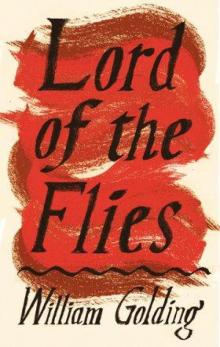 Lord of the Flies
Lord of the Flies To the Ends of the Earth
To the Ends of the Earth Free Fall
Free Fall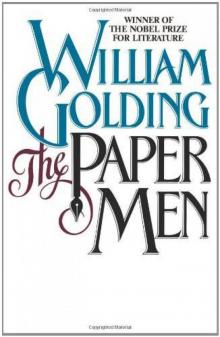 The Paper Men
The Paper Men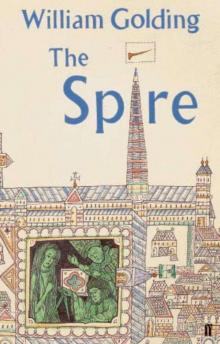 The Spire
The Spire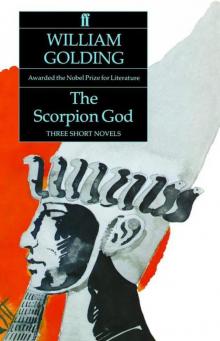 The Scorpion God: Three Short Novels
The Scorpion God: Three Short Novels The Inheritors
The Inheritors Darkness Visible: With an Introduction by Philip Hensher
Darkness Visible: With an Introduction by Philip Hensher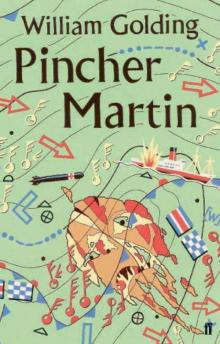 Pincher Martin
Pincher Martin The Pyramid
The Pyramid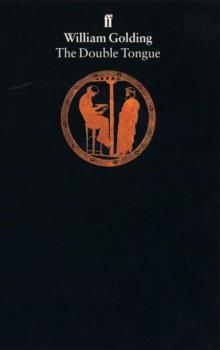 The Double Tongue
The Double Tongue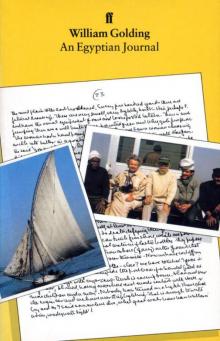 An Egyptian Journal
An Egyptian Journal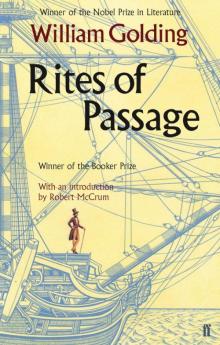 Rites of Passage
Rites of Passage Envoy Extraordinary
Envoy Extraordinary